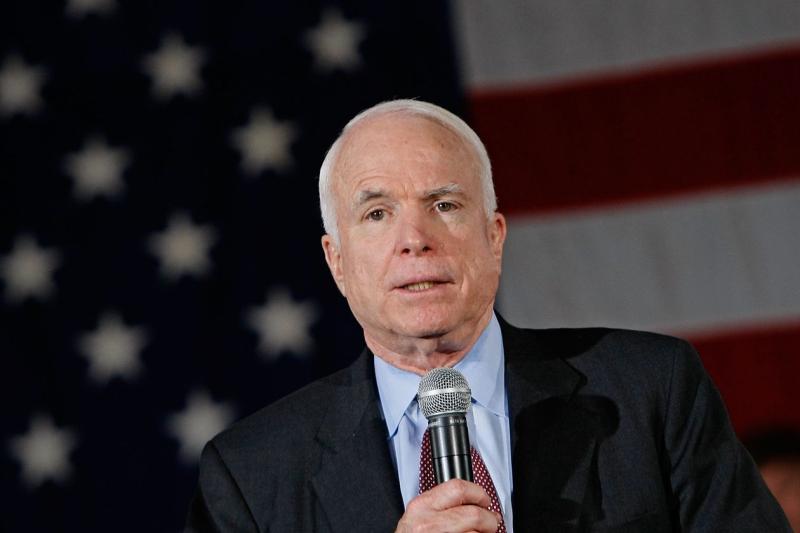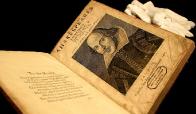'The Luckiest Man' Review: Remembering a Maverick
By: Barton Swaim (WSJ)



The late John McCain’s paternal line was touched by a kind of tragic greatness. The senator’s grandfather, “Slew” McCain, a brilliant and courageous admiral in the Pacific during World War II, dropped dead four days after the Japanese surrender; he was only 61 but, after years of high stress and hard drinking, looked far older. His son, John S. McCain Jr., a celebrated submarine commander during the war, rose to command the entire Pacific fleet during the Vietnam War. But an inner anguish, no doubt exacerbated by his own son’s imprisonment in North Vietnam for five years, drove Jack McCain, as he was known, to a debilitating alcoholism.
John S. McCain III, who became a congressman and then senator from Arizona after returning from Vietnam, was never mastered by alcohol or anything else. But there is something tragic, if I could use the word loosely, in the fact that he never attained the office he wanted so badly and for which he was so clearly well-suited. “The Luckiest Man,” a moving and lucidly written memoir by McCain’s longtime speechwriter and co-author, Mark Salter, emphasizes the great man’s optimism and gratitude. “Write how lucky I am,” he tells Mr. Salter after it becomes clear he has lost the 2008 presidential election to Barack Obama; “nobody has to feel sorry for me.” Lucky, sure. But the sense of tragedy remains.
Mr. Salter’s admiration for his old boss is profound, but he is aware, too, of McCain’s complexity. The senator had a ferocious temper, at one point nearly coming to blows with Ted Kennedy on the Senate floor. But he was also an irrepressible wisecracker. I was reminded of his answer to North Vietnamese interrogators who asked McCain for the names of the other men in his squadron. He gave them the names of the Green Bay Packers’ offensive line.
Occasionally his political adversaries would suggest that McCain’s time as a prisoner of war had rattled his mind, but this was a smear. When he returned to Vietnam as a U.S. senator in 1991, Mr. Salter remembers, McCain revealed no angst at all. The two stood by the lake into which the 31-year-old Navy pilot had fallen from the sky in a half-opened parachute in 1967. He had broken bones all over his body, and North Vietnamese soldiers loaded him in a truck and took him to Hoa Lo, the Hanoi Hilton. A quarter-century later, however, surveying the place where years of torture and privation began, the senator was ebullient. He found a monument erected near the lake naming him “Air Force Major John Sney McKay” and thought it was a hoot. Later he ribbed Vietnamese officials for the insult of calling him an Air Force major.
McCain sidestepped the question, but there is some evidence that he had wanted to be president long before he first ran for the U.S. House in 1982. He might have lost that race but for one crushing response during a debate. His opponents had raised the objection that McCain wasn’t from Arizona and had only recently moved there. McCain responded that he was a military kid and hadn’t lived anywhere very long. “As a matter of fact,” he said, “when I think about it now, the place I lived longest in my life was Hanoi.”
As an intermittent admirer of McCain the politician, however, I wish he had run for governor instead of Congress. Lawmaking is a team sport, and he wasn’t cut out for it. In the Senate, where he won a seat in 1986, McCain spent the bulk of his energies on basically nugatory “reform” issues whose main constituency was the news media: lobbying restrictions and, especially, campaign-finance laws. Mr. Salter avoids attributing any “governing philosophy” to his old boss. “I’m not sure McCain’s view on government and government service could be described as a philosophy,” he writes perceptively.
You often had the sense that McCain cared chiefly about his own honor and not for any kind of ideological consistency. His interest in limiting “soft money” campaign contributions was, I think it’s fair to say, an expression of remorse for his involvement in the “Keating Five” scandal of the late 1980s, in which a wealthy developer secured regulatory favors by means of campaign contributions. McCain was cleared of wrongdoing, but the association stung him. The Washington Post once suggested that McCain had helped an airline get a nonstop flight between Phoenix and Washington, D.C., in order to facilitate his own travel, and as a result for many years he pigheadedly vowed never to take the flight.
The lack of a governing philosophy, or anyhow the lack of interest in traditional Republican views, doomed his 2000 presidential run. For years the news media perpetuated the legend that George W. Bush beat McCain in the crucial South Carolina primary by means of dirty tricks. But McCain had no chance of winning that primary—he lost by almost 12 percentage points—for the simple reason that, with his fixation on campaign-finance reform and stiffness talking about taxes and social issues, he just didn’t sound like a Republican.
McCain used the media as much as the media used him. Mr. Salter freely admits that the press was on McCain’s side in the 2000 primary. His critics, Mr. Salter recounts—I remember it well—mocked him as “Senator John McCain (R-Media).” But conservatives, even anomalous ones like McCain, lean on the broken reed of the news media at their peril. In 2008, when he won the nomination, the journalists who had once lauded McCain set about maligning him. He and his surrogates could not criticize Mr. Obama, Mr. Salter painfully recalls, without being accused, directly or indirectly, of racism. Mr. Salter is of course right to resent the press corps’ malevolence in 2008, but his defense strikes this reviewer as naive and indicative of the candidate’s self-importance: “This wasn’t just a Republican campaign,” he protests. “It was John McCain’s campaign.”
Still, reading Mr. Salter’s fine memoir, I am confirmed in an old opinion: that it is one of the great tragedies of our politics that John McCain was never elected president. America was just unlucky, I guess.
Mr. Swaim is an editorial-page writer for the Journal.

 Article is LOCKED by author/seeder
Article is LOCKED by author/seeder
Tags
Who is online
99 visitors


A war hero, who had an unrealistic level of integrity. In the end his fatal flaw was pettiness.
The book is
THE LUCKIEST MAN
By Mark Salter

Simon & Schuster, 594 pages
McCain, Inouye and Udall a relationship that defied stereotypes. All three were combat veterans and although from different political parties accomplished much in their careers.
And Bush Sr and Bob Dole and the list goes on
And don't forget Ike!